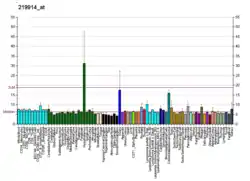ECEL1
Endothelin-converting enzyme-like 1 is a protein that in humans is encoded by the ECEL1 gene.[5][6][7]
This gene encodes a member of the neutral endopeptidase (NEP)-related family. It is expressed specifically in the nervous system. The gene disruption in mouse embryonic stem cells results in neonatal lethality due to respiratory failure shortly after birth. Based on the specific expression of this gene and the phenotype of the gene deficiency in mouse embryos, it is suggested that the protein encoded by this gene play a critical role in the nervous regulation of the respiratory system.[7]
References
- GRCh38: Ensembl release 89: ENSG00000171551 - Ensembl, May 2017
- GRCm38: Ensembl release 89: ENSMUSG00000026247 - Ensembl, May 2017
- "Human PubMed Reference:". National Center for Biotechnology Information, U.S. National Library of Medicine.
- "Mouse PubMed Reference:". National Center for Biotechnology Information, U.S. National Library of Medicine.
- Valdenaire O, Richards JG, Faull RL, Schweizer A (Mar 1999). "XCE, a new member of the endothelin-converting enzyme and neutral endopeptidase family, is preferentially expressed in the CNS". Brain Res Mol Brain Res. 64 (2): 211–21. doi:10.1016/S0169-328X(98)00321-0. PMID 9931490.
- Rump A, Kasper G, Hayes C, Wen G, Starke H, Liehr T, Lehmann R, Lagemann D, Rosenthal A (May 2001). "Complex arrangement of genes within a 220-kb region of double-duplicated DNA on human 2q37.1". Genomics. 73 (1): 50–5. doi:10.1006/geno.2000.6504. PMID 11352565.
- "Entrez Gene: ECEL1 endothelin converting enzyme-like 1".
Further reading
- Valdenaire O, Rohrbacher E, Langeveld A, et al. (2000). "Organization and chromosomal localization of the human ECEL1 (XCE) gene encoding a zinc metallopeptidase involved in the nervous control of respiration". Biochem. J. 346 Pt 3 (3): 611–6. doi:10.1042/0264-6021:3460611. PMC 1220892. PMID 10698686.
- Strausberg RL, Feingold EA, Grouse LH, et al. (2003). "Generation and initial analysis of more than 15,000 full-length human and mouse cDNA sequences". Proc. Natl. Acad. Sci. U.S.A. 99 (26): 16899–903. doi:10.1073/pnas.242603899. PMC 139241. PMID 12477932.
- Kawamoto T, Ohira M, Hamano S, et al. (2003). "High expression of the novel endothelin-converting enzyme genes, Nbla03145/ECEL1alpha and beta, is associated with favorable prognosis in human neuroblastomas". Int. J. Oncol. 22 (4): 815–22. doi:10.3892/ijo.22.4.815. PMID 12632073.
- Clark HF, Gurney AL, Abaya E, et al. (2003). "The secreted protein discovery initiative (SPDI), a large-scale effort to identify novel human secreted and transmembrane proteins: a bioinformatics assessment". Genome Res. 13 (10): 2265–70. doi:10.1101/gr.1293003. PMC 403697. PMID 12975309.
- Benoit A, Vargas MA, Desgroseillers L, Boileau G (2004). "Endothelin-converting enzyme-like 1 (ECEL1) is present both in the plasma membrane and in the endoplasmic reticulum". Biochem. J. 380 (Pt 3): 881–8. doi:10.1042/BJ20040215. PMC 1224203. PMID 14992683.
- Gerhard DS, Wagner L, Feingold EA, et al. (2004). "The status, quality, and expansion of the NIH full-length cDNA project: the Mammalian Gene Collection (MGC)". Genome Res. 14 (10B): 2121–7. doi:10.1101/gr.2596504. PMC 528928. PMID 15489334.
- Hillier LW, Graves TA, Fulton RS, et al. (2005). "Generation and annotation of the DNA sequences of human chromosomes 2 and 4". Nature. 434 (7034): 724–31. doi:10.1038/nature03466. PMID 15815621.
This article is issued from Wikipedia. The text is licensed under Creative Commons - Attribution - Sharealike. Additional terms may apply for the media files.




